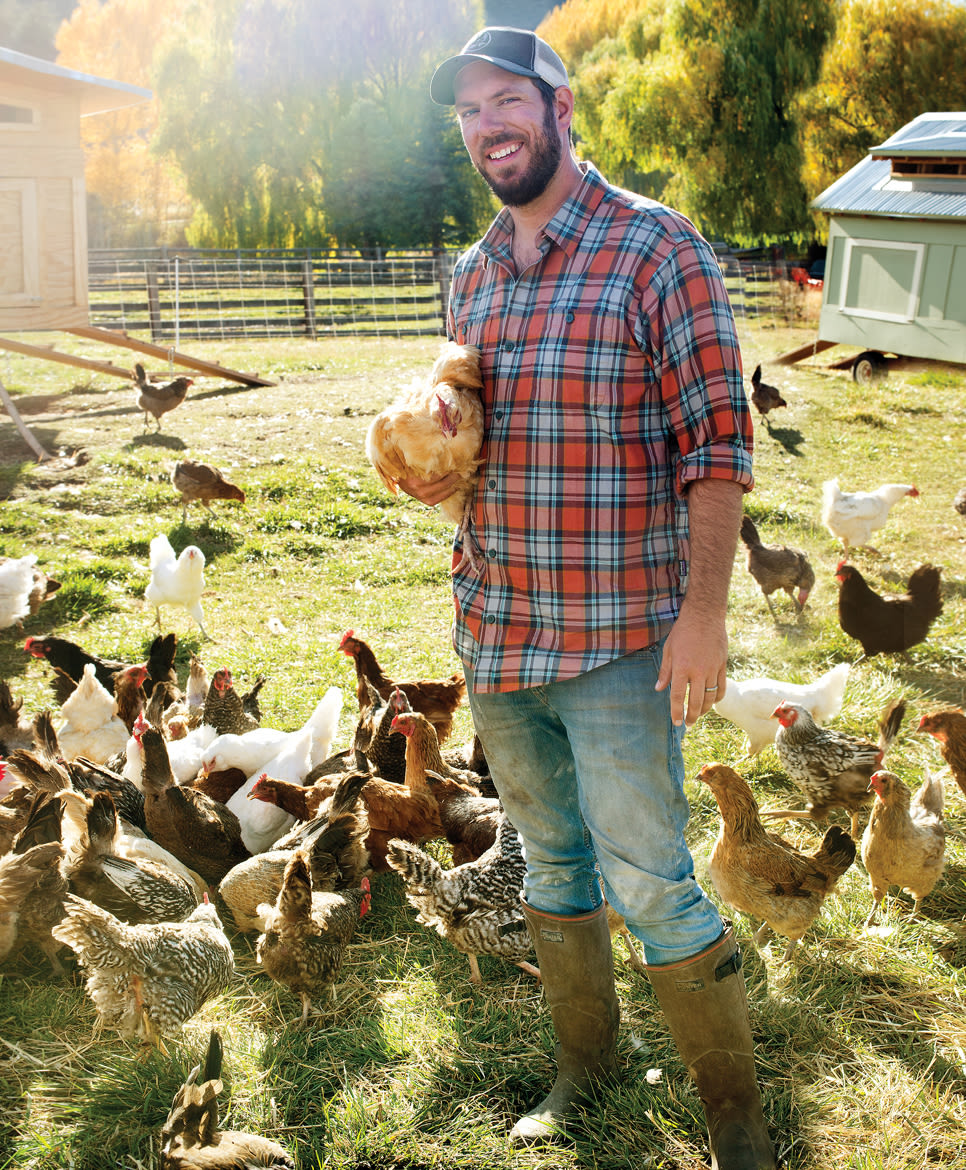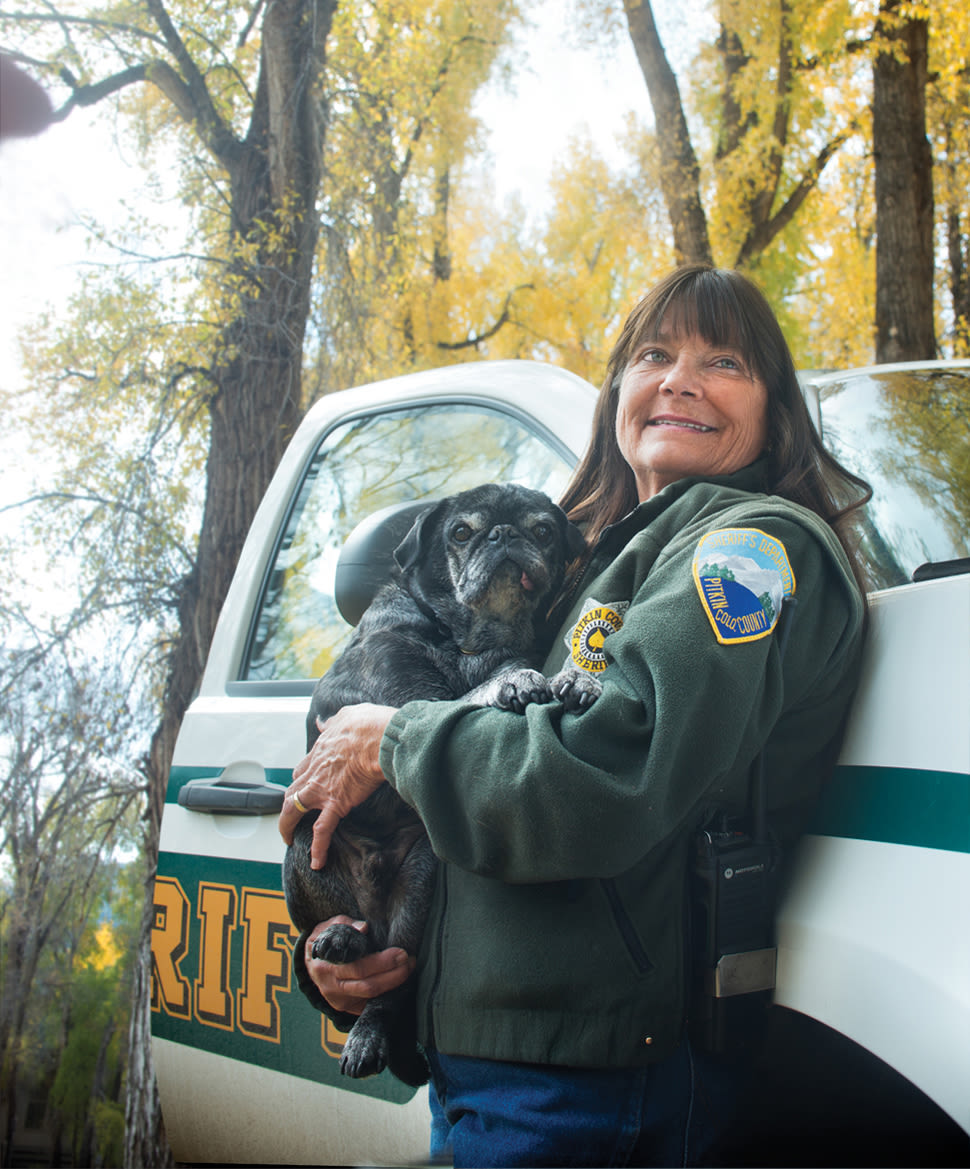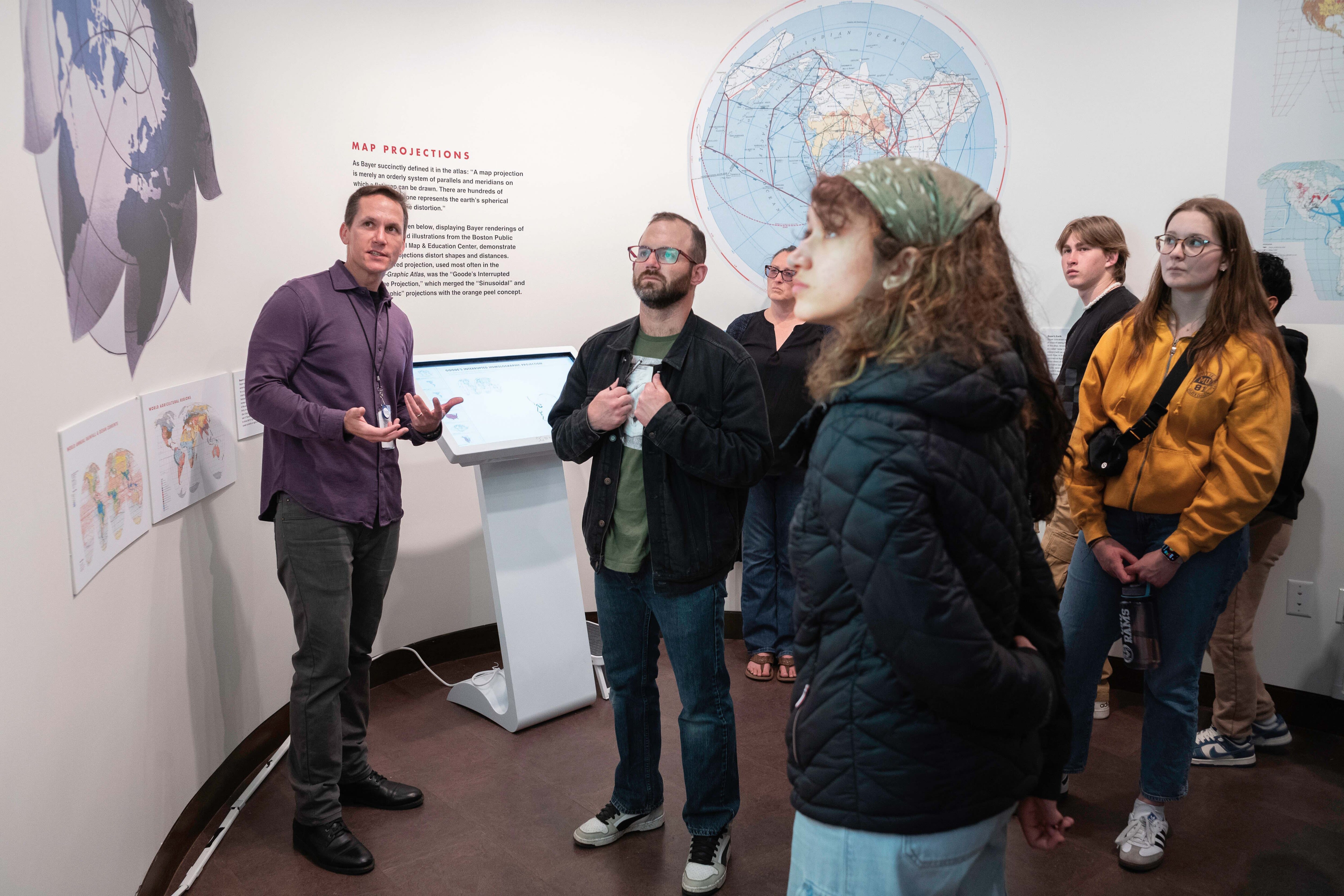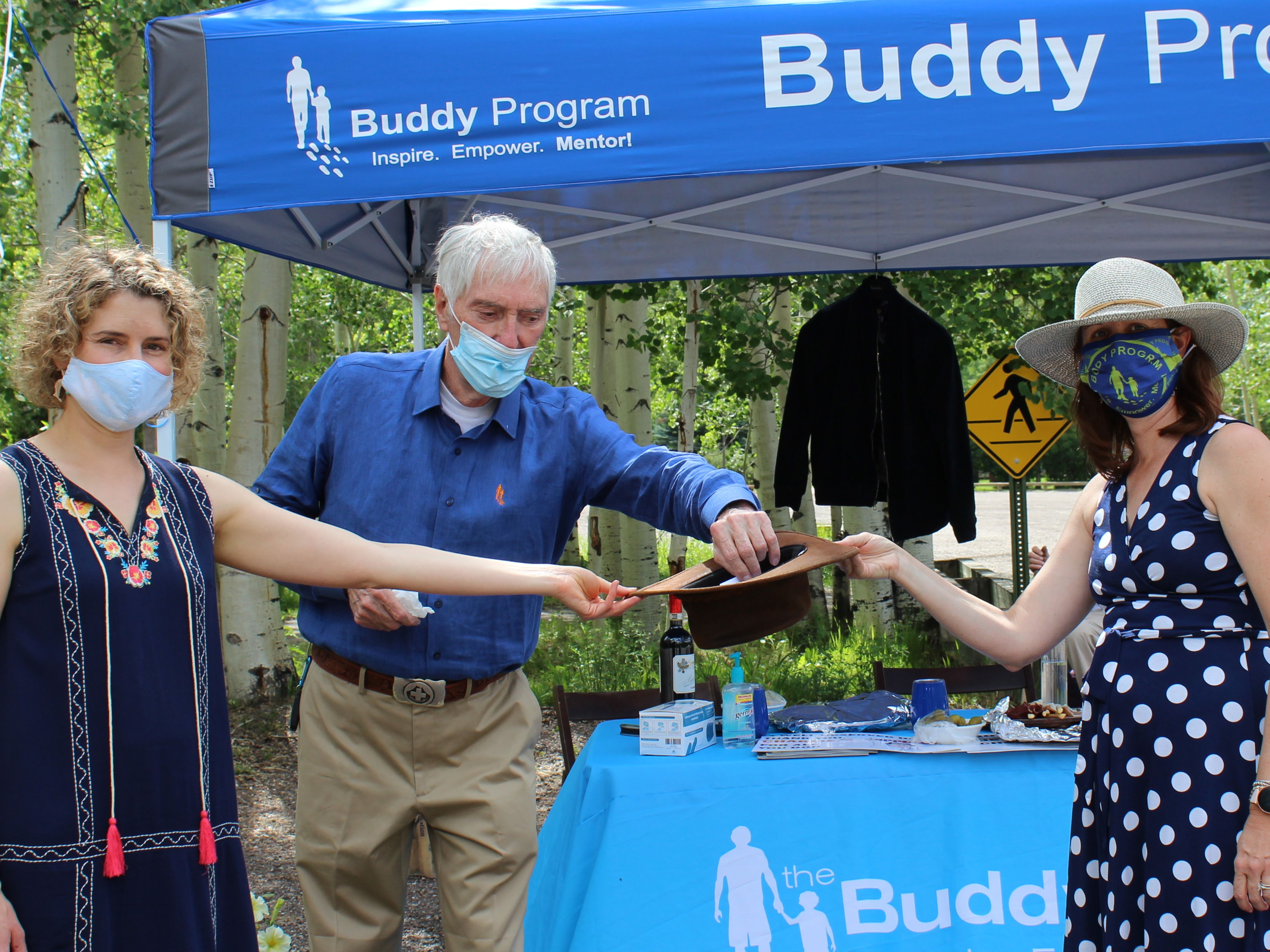
Sojourner Salutes 2016
For more than two decades, Aspen Sojourner has annually honored three locals (or local couples) for their noteworthy contributions to making Aspen, and the Roaring Fork Valley, a better community. This year’s Sojourner Salutes winners include a farmer/chef dedicated to building a strong sustainable food system, an animal lover who has devoted her career to assisting Pitkin County’s four-legged residents, and a philanthropic couple who are passionate about education.

Jason Smith with feathered friends at the Aspen Center for Environmental Studies’ Rock Bottom Ranch.
Image: Karl Wolfgang
Jason Smith
Connecting community through food.
When Jason Smith teaches students about sustainability at Colorado Mountain College, he begins by posing a simple question: What does a farmer look like to you?
Back in 2013, when Smith was named director of the Aspen Center for Environmental Studies (ACES) at Rock Bottom Ranch (RBR), he heard a typical response: “Straw hat, overalls, dumb, poor, rural,” he says. This past semester, however, that changed. Students replied that Smith himself—wearing skinny jeans, a flannel shirt, scuffed boots, and robust facial scruff—cut the current image of a 21st-century farmer.
“It was a realization moment,” Smith says. “This group of twentysomethings is seeing their peers produce food, and that’s new in the last three years. ACES has always created a culture of supporting those members of the community.”
Take Harper Kaufman and Christian La Bar: The couple launched Two Roots Farm in Carbondale last spring, after working side-by-side with Smith for two years in the fields at RBR. Two Roots also partners with Missouri Heights–based Spradley Farms, run by Mike and Allison Spayd (she’s a former director of RBR), in a CSA program. Smith rattles off other newcomers to the downvalley foodscape: Roaring Gardens at TCI Lane Ranch, Wild Mountain Seeds, and Mountain Primal Meat Company, to name a few.
“We’re setting up models where the new generation can see our mistakes and successes, and get started on their own ventures,” says Smith, pointing to Tom Cardamone’s vision when he established ACES in 1968: to incorporate food systems into environmental education and environmental literacy. “There are more producers than ever before.”
He’s one of them, of course. On any given day Smith might be found on the 113-acre wildlife preserve in Basalt, planting vegetable crops; feeding chickens, pigs, and sheep raised for eggs or meat; or collecting honey. He trucks bounty to farmers’ markets and restaurants, spring to fall. He hauls hay bales, cuts trails, and helps design greenhouses that combine cutting-edge technology with tried-and-true practices. Active with local government, he’s helping to implement more secure food systems; together ACES, the City of Aspen, and Pitkin County introduced the area’s first-ever vegetable garden tour in August.
“Everything is because we have such an incredible team,” Smith says, crediting his dedicated crew and the nonprofit’s passionate board for steady growth. “It all stems from a love of food and sharing food.”
Born into a restaurant family and a cook since youth, Smith landed in Aspen at The Little Nell in 2003, during the Paul Wade/Ryan Hardy era. Today he’s Rock Bottom Ranch’s head chef, featuring food grown just steps from the open-air pole barn that hosts a half-dozen farm-to-table dinners for up to 100 people each year. (This year RBR initiated a resident-chef program out of its newly revamped demonstration kitchen.)
But it is his role as agricultural educator—overseeing RBR programs in 54 schools valley-wide, leading farm tours, talking nutrition with curious shoppers—that has Smith most excited.
“The reason this works so well is the community,” he enthuses. “I’m so lucky because we have support and energy around [RBR]. The hero should be ACES—and it is.”
—Amanda Rae

ReRe Baker with Simon the pug.
Image: Karl Wolfgang
ReRe Baker
A longtime advocate for local animals.
As a child, ReRe Baker yearned to become “the dog catcher” when she grew up. She made that dream a reality when she was hired as a Pitkin County animal control officer in 1983. Now, as animal safety director, the role she assumed in 1994, Baker oversees protection for animals ranging from furry family members to the livestock and critters common in a rural area like Aspen.
Not surprisingly, Baker has held an affinity for animals most of her life. Before following her sister from Texas to Aspen after high school, she spent her weekends riding horses, tending to plenty of pets in the family home, and working at the Houston Children’s Zoo.
“This job is part of who I am and who I grew up to be,” she says. “I wouldn’t do it anywhere else but this county, though. Everybody here truly loves their pets, and they look out for other people’s pets. I’m spoiled.”
Defying the stigma often associated with animal control, Baker’s approach has earned her respect throughout the community. “If I’m on a call for a dog running at large or for a bite, the owner is so scared I’m going to take the dog away and euthanize it,” she says. “Maybe where they came from that’s the norm, but our protocol is just the opposite. Sure, I might issue a ticket, but I work with people to correct a problem and figure out how we can prevent it from happening again.”
Adds Seth Sachson, executive director of the Aspen Animal Shelter, who’s worked with Baker for 24 years, “Whether interacting with people or animals, ReRe is calm, collected, and informed.”
But dogs on the loose and other animal control calls are only part of Baker’s daily routine. She also serves as the county’s emergency support lead for critical incidents like fires and floods, and helps lead in-depth evacuation drills and training seminars. In a recent hypothetical forest-fire exercise, for example, Baker worked with city officials, Cozy Point Ranch’s Patti Watson, and local rancher Jeff Groom on a mock evacuation of a thousand head of cattle.
“I do a lot of things outside of my job description and also on a state level,” notes Baker, who also serves on several local and regional animal-welfare-related boards, including the Aspen Animal Shelter. “And I am forever learning. If I don’t learn something new daily—no matter how minute—then to me it’s like, ‘Why did you get up in the morning?’”
Laurie Smith, with Snowmass Village Animal Services, credits Baker for her invaluable compassion and her willingness to share knowledge. “ReRe is genuine and makes you feel like you are learning with her, even though she is the wealth of information,” she says.
A couple of years after being hired, Baker realized another dream, meeting the love of her life. Her now-husband, Monty, asked her out to go riding after she doctored his injured horse. The couple, who has a 29-year-old son, lives in Blue Lake with two “avid backyard-bird-hunting Labs.”
Tearing up at the mention of her countless dog recoveries over the past three decades, Baker acknowledges, “The day I quit crying is the day I know it’s time to retire.” Luckily for Pitkin County residents, that seems unlikely to happen anytime soon.
—Katie Shapiro

Terri and Tony Caine with some of the students who participated in the Summer Advantage program at Basalt Elementary School.
Image: Karl Wolfgang
Terri & Tony Caine
Investing in the future, one step at a time.
In 2010, Tony Caine, an avid hiker, climbed all 54 of Colorado’s 14,000-foot-plus peaks in one season. But he wasn’t in it for the bragging rights. Instead, his mission was to raise awareness of educational opportunities for promising low-income kids. That same year, Tony and his wife, Terri, launched their nonprofit, Summit 54, to help students in Colorado achieve scholastic success.
“Climbing a mountain can seem like a daunting task if you’ve never done it before,” says Tony. “The same can be said for a child that comes from nothing. Summiting all those 14ers was a kind of analogy. If you are prepared with a plan, perseverance—no matter the odds—comes more easily.”
The founder of Spyglass, an early Internet software company, and chairman of two hedge funds, Tony is passionate about improving children’s lives through education. Earlier in his career, while working for Apple, he was charged with administering educational grants for his region, an assignment he says immediately tugged at his heartstrings. “In good years, I was able to distribute generous sums of money with a smile on my face,” he recalls. In leaner times, he had to deliver the bad news of grant requests unmet, a task so emotionally draining that he chokes up just talking about it.
Terri, a 32-year Roaring Fork Valley resident and former public relations exec, shares her husband’s passion. They aim to ensure that all Colorado students graduate from high school ready for a career or college. It’s a tall order, but one the Caines feel optimistic they can achieve through their methodic approach.
Currently, Summit 54’s efforts reach more than 1,000 students annually. Terri and Tony use the same business acumen that informed their respective careers to gather data-driven metrics for optimal resource allocation, leverage private philanthropic funding with public sources, and foster partnerships between school districts and other entities.
The Caines are particularly proud of their partnership with the Roaring Fork School District (RFSD). In 2012, budget cuts eliminated a program designed to reverse summer learning loss, considered especially prevalent among lower-income kids. In response—and unbeknownst to district officials—Terri applied for and received a grant to bring in Summer Advantage, a voluntary five-week intensive learning program.
Basalt Elementary School principal Suzanne Wheeler-del Piccolo recalls her first meeting with Terri. “She introduced this program that would have a tremendous impact on helping our kids succeed because it was well-rounded in both life experience and academics. Why would I ever say no to that?”
Now offered in Basalt, Carbondale, and Glenwood Springs, Summer Advantage has a proven track record of helping students in grades K-4 maintain reading and math skills. Terri notes that 84 percent of local program participants already receive free or reduced lunch through the National School Lunch program, a statistic she says can be hard to comprehend. “The RFSD is 20 minutes away from Aspen, and yet so many people simply don’t realize how much poverty exists in our valley.”
Through Summit 54, the Caines have also partnered with College Track, a national college preparatory program, and helped fund a public charter school network in Denver. Locally, they work with the RFSD’s Pre-Collegiate Program, which gives academic and financial support to secondary-school students who would be the first in their families to attend college.
The couple also serves on several boards: she at Theatre Aspen and Aspen Country Day School, where their 12-year-old daughter is a student, he at the Aspen Community Foundation.
Terri credits her long career in Aspen for her altruistic outlook. “So many opportunities have come my way, and always in the back of my mind, I’ve wanted to give back,” she says. Fortunately for the students benefitting from Summit 54, that time has come.
—Sarah Chase Shaw














































